INTERNATIONAL COPYRIGIIT.
Manchester, 7th November 1855.
SIR—A few remarks made by Mr. Putnam, at a recent meeting of book- sellers and authors in New York, induces me to believe that the time has at length arrived when the question of an international copyright between England and the United States might be reopened with some prospect of a successful issue. I believe it must be admitted that the obstacles to such a measure have invariably had their origin in America. So long as the num- ber of books likely to prove profitable on republication, issued on this side of the Atlantic, outweighed the number produced on the other side, the American publishers, through their Government, were determined not to grant to our claims any measure of justice whatsoever. It was undoubtedly to their immediate pecuniary interest to uphold the unjust law as it stood, however detrimental it might prove to the interests of native authors or to the development of literary ability in America itself. Mr. Putnam's remarks seem to indicate that the tide is turning, and that American publishers are now willing to accede to the views so often ably urged in this country. Re- ciprocity in justice to literature on both sides, he said, was rapidly becoming more important to them than to England. In the year 1834, there were 198 reprints in the United States to 252 original works ; but in 1853, whilst the reprints showed some increase on the above number, the original pro- ductions exhibited a much greater comparative preponderance. On the other hand, during the whole history of the Union up to 1842, England had only reprinted 382 American books ; but in 1854 this total had advanced to 950, of which 115 were produced in 1853 and 185 in the following year,—an evidence that republication was very rapidly increasing. We may gather from these observations that it is still a mere matter of statistics with the Americans. To us, however, it is fast becoming of para- mount moral importance ; and if any arguments beyond those already adduced in favour of international copyright were needed, they might be founded on a consideration of the pernicious influence which this same in- creased republication of American literature is at present exercising in Eng- land. Books of a character so unwholesome, and of a moral tone so de-' teriorating, that if originally written here they would hardly have secured publicity even in our cheap periodical journals, have been reprinted by re- spectable publishers, and issued at rates that necessarily bring them within the reach of all, and render them formidable competitors to the healthier productions of our own authors. Indirectly, a measure enforcing inter- national copyright would have the effect of checking, and ultimately of meriting out of eweulation, this mass of injurious and unwholesome literature. Itr. Putnam may be considered as a fair representative of the publishing interest in the United States ; and it would be well if our Government, seeing the tendency of opinion as expressed by him, would endeavour to learn the views of the American Government on this question, and, if .possible, eeeure the adoption of a measure the justice and desirability of winch has been so



























 Previous page
Previous page